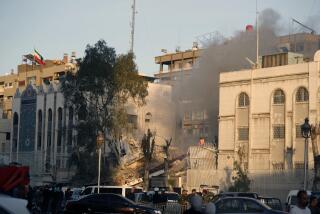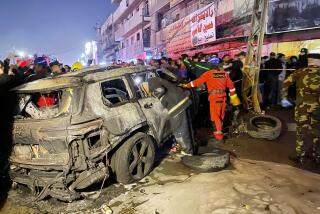Claim that Jordanian airstrike killed U.S. hostage met with skepticism
Islamic State extremists said Friday that Jordanian warplanes operating as part of the U.S.-led coalition attacking militant targets had killed an American female hostage, an assertion greeted with deep skepticism in Washington and Amman.
In a statement posted on a Twitter account, the radical group said the Jordanian bombardment hit a compound where the hostage, Kayla Mueller, 26, a humanitarian worker, was being held near the northern Syrian city of Raqqa, an Islamic State stronghold.
“The crusader criminal air force struck a site outside of Raqqa city today at noon during Friday prayers, and the strikes lasted for one hour,” said the Islamic State message. “And we have confirmed the death of the American hostage by the bombs that fell on the site.”
The militant message — titled “The losing Jordanian Air Force kills an American hostage” — included photos of a bombed-out building complex where the fatal airstrike supposedly took place.
There was no immediate corroboration of the hostage’s death by U.S. intelligence officials, said Eric Schultz, a White House spokesman. The administration was “deeply concerned” about the reports, he said.
Mueller’s parents, Carl and Marsha Mueller of Prescott, Ariz., issued a statement Friday night asking that their daughter’s captors contact them privately regarding her safe release.
“To those in positions of responsibility for holding Kayla; in adherence to your warnings and out of concern for Kayla’s safety, we have been silent until now,” the statement said, noting that Kayla Mueller’s name became public Friday. She was abducted in Syria on Aug. 4, 2013.
“We are still hopeful that Kayla is alive,” the parents’ statement said. “At this time we ask you, who are holding Kayla, to contact us privately.”
Earlier, Jordanian authorities had denounced the assertion by Islamic State as a “publicity stunt” meant to drive a wedge between Amman and Washington, close partners in counter-terrorism and other security matters.
Jordan has been a key Arab participant in months of U.S.-led air campaign against Islamic State, which President Obama has vowed to “degrade and ultimately destroy.”
Amman has taken a defiant and vengeful approach to the militants since news broke this week that a captive Jordanian pilot, Lt. Moaz Kasasbeh, had been burned to death by his Islamic State captors. Jordanian media have boasted of Jordanian Air Force F-16 fighter jet strikes on Raqqa on Thursday and Friday, though Amman has not confirmed any specific targets.
The Pentagon said airstrikes were made Friday against Islamic State positions but declined to say where. Jordanian air assaults are conducted in conjunction with U.S. military planners.
Still, the sensational report of another American hostage killed — this time purportedly by an allied air force — immediately resounded on the Internet, in cable news channels and in daily headlines.
It had been known for months that Mueller, from Arizona, had been a prisoner of Islamic State. News outlets had respected the family’s wishes not to name her out of concern for her safety.
But on Friday the family released information about Mueller, who had been a prisoner for 18 months, according to a statement that described her as a highly dedicated and devout young woman. After months of secrecy about her case, her smiling image accompanied international news coverage.
“The common thread of Kayla’s life has been her quiet leadership and strong desire to serve others,” the family statement said.
Islamic State abducted her in the northern Syrian city of Aleppo after she left a hospital run by Doctors Without Borders, the international aid group, the family said.
In a statement, Doctors Without Borders said Mueller, who was not an employee, had accompanied a technician sent by a company contracted by the organization to perform repairs at one of its buildings in Aleppo. The technician and Mueller spent the evening at the Doctors Without Borders hospital in Aleppo for safety reasons, according to Tim Shenk, U.S. spokesman for the organization.
She was abducted the next day en route to the bus station in Aleppo, where she planned to depart for Turkey, the spokesman said.
Mueller’s family said she had been working with Syrian refugees in the region since December 2012.
“She is extremely devoted to the people of Syria,” the family statement said.
Mueller was believed to be the last U.S. hostage held by Islamic State, which has beheaded three U.S. citizens: journalists James Foley and Steven Sotloff, and an aid worker, Peter Kassig. All were killed in retaliation for U.S. airstrikes, the militants said.
Islamic State has also executed two British aid workers and two Japanese men, a journalist and an aspiring security contractor.
All of the slain foreign hostages were abducted in Syria, which has been battered by an almost four-year war that has seen the rise of radical Islamic groups in the once stable nation. Islamic State has also executed hundreds of Syrians and Iraqis as it has grabbed territory across the two nations.
Jordan is one of a number of Arab nations participating in the U.S.-led coalition that has been bombing Islamic State targets in Syria since September.
Pentagon spokesman Col. Steve Warren said U.S. drones, refueling tankers and radar-evading F-22 fighter jets escorted Jordanian warplanes Thursday during airstrikes on targets in Syria. The spokesman did not specify what targets were hit.
An unofficial pro-Islamic State news outlet, Aamaq News, reported that coalition warplanes had conducted more than 10 strikes Friday on targets in Raqqa. But neither Jordanian nor U.S. officials confirmed that Raqqa was targeted Friday.
In Jordan, the allegation that its warplanes had killed a captive American were brushed aside as propaganda.
“They tried to cause problems internally in Jordan and haven’t succeeded,” Jordanian Interior Minister Hussein Majali told CNN. “They are now trying to drive a wedge between the coalition with this latest low PR stunt.”
Analysts also cautioned against taking the statement at face value. Islamic State, skillful in the art of propaganda, has issued many misleading messages and has tried to capitalize on the fate of its hostages.
In the recent case of the Jordanian pilot, for instance, Islamic State indicated to Jordanian authorities that it would hold off on executing him if Amman released an Iraqi militant on death row. But Jordanian authorities now say that the pilot had been killed weeks earlier and the militants were leading them on.
Some of those who have been privy to communications with militant networks about hostages also expressed skepticism about the version of events presented by Islamic State, which is also known as ISIS.
“There’s always been some concern, especially after the death of the Jordanian pilot, that ISIS would try to manipulate the optics around her captivity,” said Joe Kasper, deputy chief of staff for Rep. Duncan Hunter (R-Alpine), who sits on the House Armed Services Committee.
“We shouldn’t assume that this American died in an airstrike. ISIS has not negotiated in good faith and has no credibility.”
Times staff writer McDonnell reported from Beirut and special correspondent Bulos from Amman, Jordan. Times staff writers W.J. Hennigan in Washington and Alexandra Zavis in Los Angeles contributed to this report.
Follow McDonnell on Twitter at @mcdneville for news out of the Middle East
More to Read
Start your day right
Sign up for Essential California for news, features and recommendations from the L.A. Times and beyond in your inbox six days a week.
You may occasionally receive promotional content from the Los Angeles Times.






